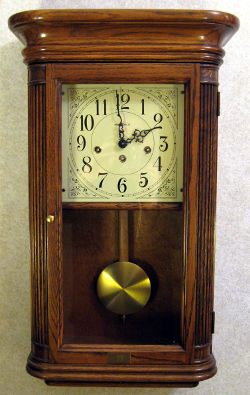 When I came downstairs to eat breakfast before going to church, I saw that the wall clock had stopped.
When I came downstairs to eat breakfast before going to church, I saw that the wall clock had stopped.
It’s a “grandmother” clock my father received as a gift for 20 years of service with the company he worked for. He wouldn’t make it to 30. That company downsized him nine months before he was to receive his full retirement package. Nine months.
Still, it’s a nice clock, and it was given under a different company ownership, when people still cared, before the relentless string of mergers and ownership swaps.
Because it’s a grandmother clock, it chimes every 15 minutes. And because it chimes every 15 minutes, it has three keyholes where you stick in a key and wind it. I wind it pretty religiously, but life is filled with distractions, especially this time of year, and I forgot that regular task.
The hands read 1:59. Sometime in the a.m., it had stopped right before it was due to chime.
Having had the clock all these years, I take the chiming for granted. I think any owner of such a clock does. After a while, you don’t notice the chiming as much. When it fails to chime, you don’t realize it. You have to note the lack of pendulum movement, and then you know.
Something about a stopped clock makes me a little sad. That clock is wondrously alive so long as all its springs remain tightly wound, and the slow tick-tock fills the foyer. It’s a comforting sound, one that recalls a different, slower time. A time of artisans working deftly on such things as grandmother clocks, of great-grandfathers smoking a pipe while reading the newspaper, of sepia-toned memories and a sense that what is to come is a marvelous thing where people are somehow better than they are now.
I wonder what Christian people in the age of grandmother—and grandfather—clocks thought the present age might be like. What can a clock tell us?
My clock stopped a minute before it was due to chime twice. Slack springs couldn’t do the job of alerting us to the hour. People in the household forgot their duty, so the clock tick-tocked until it ran out of stored energy. It had been running on its last winding for too long and had no power left. Without that power, no alert sounded. It took a long time for anyone to notice the clock had stopped.
The silence of a stopped clock doesn’t register immediately. One must know to listen for it. If no one listens, and no one considers what was once present is no longer, the clock persists in its mute deadness.
A stopped clock is still right twice a day—so goes the old joke. Still, a stopped clock is far more wrong than right. It becomes less than helpful, because if you don’t see or hear it actively working, it gives mistaken information that can lead astray. What was once critical to one’s proper functioning is now detrimental. A stopped clock becomes an excuse for lateness and for failing to attend to important matters.
A long time ago, a stopped clock was a major problem. How can it be reset unless another, working timepiece is present in the household? If the stopped clock was the sole teller of time locally, one had to go elsewhere to discover the correct time. In some communities, the church belltower might have a clock. Or the village square. Today, centralized timepieces are mostly lost to the past. Oddly, time signals fly continuously through the air now—but beyond perception without special gadgets to snag them. The proper time is always with us, but we can’t sense it without help. Those special clocks that intercept hidden signals require something more than just the simple human intervention of a winding. The average person might understand how a wound clock works, but the new kind are inscrutable to all but the most technically adept.
Some would argue that the new technology behind clocks renders the old act of winding a clock moot. Everything has a clock in it nowadays. Funny, though, that so few can truly tell us the time.
